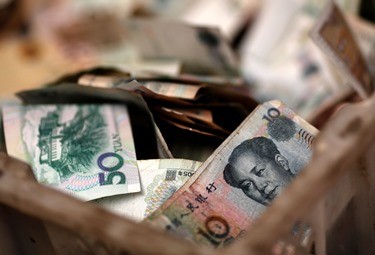The Central Banking Publications survey sponsored by HSBC Holdings Plc has predicted that the Chinese currency, the yuan, will make up 10 percent of the world reserves by 2025, with the major support of Asian monetary institutions.
According to the survey conducted in March, an estimated 2.9 percent of foreign-exchange stockpiles will be shared by the yuan by the end of 2015, which will include $5.9 trillion in reserves provided by 72 monetary authorities.
The survey indicated that 35 monetary authorities have declared that they either hold the yuan or are considering holding it.
The China Daily reported that the survey results came as China has urged the International Monetary Fund to include the yuan in the agency's review of the four-currency reserve basket at a review this year. Inclusion of the yuan as currency reserve will pose a challenge to dollar as the dominant currency in world trade and finance.
"Becoming part of the Special Drawing Rights will also accelerate the yuan's adoption while reforms in China could enhance investment options for reserve managers," Christian Deseglise, HSBC's global head of central banks and reserve managers, said in a statement released on April 13, Monday.
Last month, another HSBC survey revealed that 17 percent of companies worldwide used the yuan to settle trades, down from 22 percent a year earlier, China Daily reported.
According to the Society for Worldwide Financial Telecommunications, the yuan slid two levels to seventh place globally among the most-used currencies in February, with the dollar and euro dominating the markets and accounting for 72 percent of the payment system. The yuan fell behind the British pound, Japanese yen, Swiss franc and Canadian dollar.
Zhou Xiaochuan, governor of the People's Bank of China, said during the Boao Forum for Asia last month that China is set to revamp its foreign-exchange rules this year, as the yuan moves at a maximum 2 percent daily, on either side of a reference rate set by the PBOC. He said that restrictions on capital flows, with both inbound and outbound investments from designated programs, also affect the yuan's movement.
According to the Central Banking Publications survey, global reserve managers are concerned of the yuan's convertibility, as well as its limited investment options and credit quality.




























